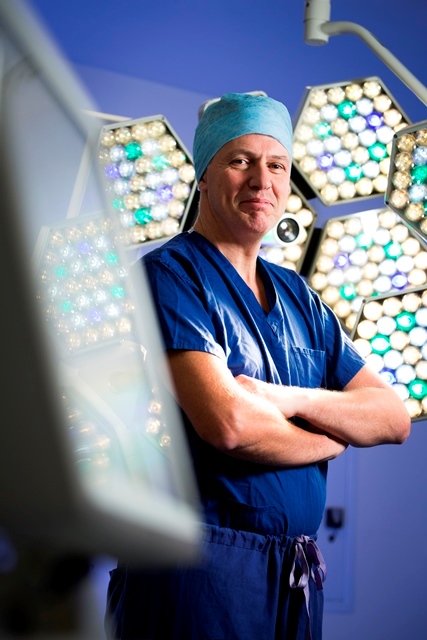
A grant which aims to improve outcomes for people undergoing liver cancer surgery, has been awarded by Cancer Research UK to researchers, including staff at the Royal Free London.
The £494,000 grant will enable researchers, including Professor Brian Davidson, clinical lead for the project and Professor Kurinchi Gurusamy, who works alongside Professor Davidson in the surgery department at the Royal Free London, to develop a pioneering new imaging technique, known as photoacoustic imaging (PAI), for use in laparoscopic liver surgery for the first time. The improved imaging provided by PAI should make the location and extent of the cancer easier for surgeons to detect during laparoscopic or ‘keyhole’ surgery and help ensure the removal of all affected tissue.
Liver cancer affects approximately 1.4 million people globally each year. Surgery is the main form of treatment.
Laparoscopic surgery is a minimally invasive procedure which results in less pain, faster recovery and lower costs than open surgery. However laparoscopic liver surgery is very technically challenging. Due to the small incision, surgeons have limited vision which increases the risk of cancerous tissue going undetected.
To prevent cancer recurring, all affected tissue needs to be removed, while at the same time as much of the healthy liver should be preserved to ensure recovery of liver function and regeneration. This delicate balancing act requires the ability to precisely detect tumours and identify their margins – currently beyond the capabilities of conventional imaging techniques.
Photoacoustic imaging (PAI) is an emerging technique based on laser-generated ultrasound waves. It can provide high-resolution 3D images and is well-suited for seeing blood vessels and measuring oxygen saturation. The main form of liver cancer, hepatocellular carcinoma, shows a greater density of small blood vessels and higher oxygen saturation than neighbouring healthy liver tissue. As a result, PAI is expected to offer a much clearer view of tumours than conventional ultrasound imaging which is unable to reveal tumour vessels with sufficient contrast or measure oxygen saturation.
Professor Brian Davidson said: “This is a potentially pioneering development in the treatment of human liver cancer – PAI has never before been applied in this context. By improving the efficacy of laparoscopic liver cancer surgery and decreasing the associated risks, more patients could access this form of treatment. This technique could light the way for the minimally-invasive treatment of other abdominal cancers, such as pancreas and kidney cancer. If PAI gives us the results we expect in this scenario, then from testing and modification to manufacture we estimate it will take around five years till it becomes an integral part of our surgical toolkit.”
The project is a multidisciplinary collaboration between physicists, engineers, surgeons and radiologists. The project is being co-led by Professor Paul Beard working within the UCL Department of Medical Physics and Biomedical Engineering and Professor Brian Davidson in the UCL Division of Surgery, both linked with UCL Institute of Healthcare Engineering and Wellcome / EPSRC Centre for Interventional and Surgical Sciences.
 Translate
Translate